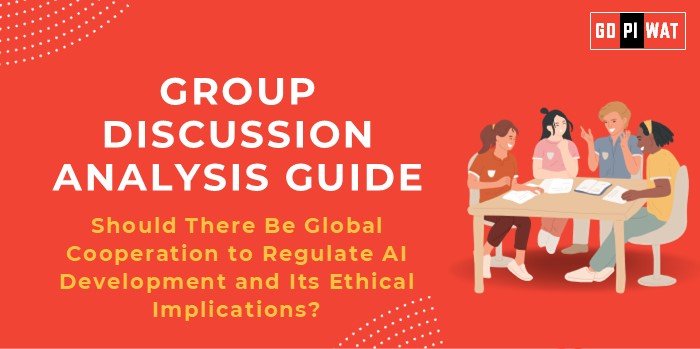📋 Group Discussion (GD) Analysis Guide
🌐 Should There Be Global Cooperation to Regulate AI Development and Its Ethical Implications?
🌟 Introduction to the Topic
Opening Context: Artificial Intelligence (AI) has revolutionized industries globally, from healthcare to autonomous transportation. However, the technology’s rapid growth has sparked debates on its potential misuse, ethical dilemmas, and the need for robust regulation.
Topic Background: AI’s development has often outpaced regulatory measures, leading to risks such as biased algorithms, mass surveillance, and weaponization. Calls for global cooperation are growing, with organizations like the UN and the OECD emphasizing the importance of unified frameworks for AI governance.
📊 Quick Facts and Key Statistics
- 📈 AI Market Growth: Projected to reach $1.5 trillion by 2030 (Statista, 2024).
- ⚖️ Ethical Concerns: Over 40% of AI systems exhibit biases (MIT Study, 2023).
- 🌍 Global Usage: 70+ countries use AI for governance, often without ethical oversight (WEF, 2024).
- 🔫 Weaponization Risks: Over 30 countries are developing autonomous weapons using AI (Stockholm International Peace Research Institute, 2024).
🤝 Stakeholders and Their Roles
- Governments: Formulate regulations and fund research for ethical AI.
- Tech Companies: Innovate responsibly while complying with ethical guidelines.
- Civil Society: Advocate for transparency and accountability.
- International Bodies: Create frameworks for cross-border AI collaboration.
🏆 Achievements and Challenges
Achievements:
- 💉 Enhanced Healthcare: AI-assisted surgeries have reduced error rates by 30%.
- 🌍 Global Collaboration: The EU’s AI Act serves as a global model for regulation.
- 📘 Innovation in Education: AI-enabled tools are improving global literacy rates.
Challenges:
- ⚖️ Regulatory Gaps: Lack of a global AI framework leads to fragmented policies.
- 🚨 Ethical Concerns: Discrimination in AI decisions impacts marginalized communities.
🌍 Global Comparisons:
- Success: Canada’s Pan-Canadian AI Strategy emphasizes ethical AI use.
- Failures: Limited AI regulation in developing nations exacerbates inequalities.
📚 Case Studies:
- The European Union’s AI Act as a benchmark for ethical standards.
- Bias in facial recognition software impacting criminal justice systems in the US.
🗣️ Structured Arguments for Discussion
- Supporting Stance: “Global cooperation in AI regulation is essential to prevent misuse and ensure ethical development worldwide.”
- Opposing Stance: “Different nations have diverse priorities; a universal AI framework may hinder innovation.”
- Balanced Perspective: “While global AI regulation is necessary, it should allow flexibility for regional adaptation.”
🎯 Effective Discussion Approaches
- Opening Approaches:
- “With the AI market projected to reach $1.5 trillion, global regulation is imperative for sustainable growth.”
- “Unchecked AI systems have exhibited over 40% bias rates, raising questions about accountability.”
- Counter-Argument Handling:
- Address concerns about stifling innovation by citing Canada’s strategy, which balances ethics and growth.
⚖️ Strategic Analysis of Strengths and Weaknesses
- Strengths: Uniting nations under ethical AI standards, preventing misuse.
- Weaknesses: Geopolitical tensions may hinder consensus.
- Opportunities: Lead global AI policy frameworks, enhance global trust.
- Threats: Lack of regulation risks AI weaponization and societal harm.
📌 Connecting with B-School Applications
- Real-World Applications: AI governance in business ethics or public policy projects.
- Sample Interview Questions:
- “What role can businesses play in ethical AI development?”
- “How can AI policies bridge the digital divide globally?”
- Insights for B-School Students:
- Focus on AI’s socio-economic impacts for projects.
- Develop frameworks for ethical AI in leadership modules.


